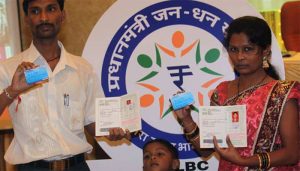 NewDelhi: There is both statistically significant and economically meaningful drop in consumption of intoxicants such as alcohol and tobacco products in states where more Prime Minister’s Jan Dhan Yojana (PMJDY) accounts opened, a study by the State Bank of India’s economic research wing has said.
NewDelhi: There is both statistically significant and economically meaningful drop in consumption of intoxicants such as alcohol and tobacco products in states where more Prime Minister’s Jan Dhan Yojana (PMJDY) accounts opened, a study by the State Bank of India’s economic research wing has said.
“This could be because of Jan Dhan-Aadhaar-Mobile (JAM) Trinity which has helped in better channelising government subsidies and helped in curbing the unproductive expenditure such as alcohol and tobacco expenses in rural areas,” the report said.
The report added that there is also increase in household medical expenditure in more exposed regions like Bihar, West Bengal , Maharashtra and Rajasthan, among others, since October 2016 due to changing lifestyles and increased demand for medical services.
The SBI report further said that the states with more number of Pradhan Mantri Jan Dhan Accounts have witnessed rural inflation at lower levels.
Analysing the impact of PMJDY accounts on rural and urban consumer price index, the report noted that besides formalisation of the economy, financial inclusion has had tangible benefits which are visible in the inflation data.
“The data shows that the states where more number of Jan Dhan accounts opened, the rural inflation is at lower level. This indicates that formalisation of economy has happened,” the report said.
The Consumer Price Index (CPI) or retail inflation stood at 3.28 percent in September as against 4.39 percent in September 2016.
The report expects CPI inflation to remain sub-4 percent till December 2017 and remain sub-4.5 percent thereafter this fiscal.
As many as 30 crore families have got bank accounts since the launch of India’s biggest ever bank account opening drive, Jan Dhan Yojana, three years back.
Top ten states accounted for 23 crore accounts (75 percent) with Uttar Pradesh topping the list at 4.7 crore accounts, followed by Bihar (3.2 crore) and West Bengal (2.9 crore).
Nearly 60 percent of Jan Dhan accounts have been opened in rural areas alone.
About 42 percent of households were unbanked before the Jan Dhan Yojana, which aims to give every household access to banking facilities by offering them zero-balance accounts across all commercial banks.
The number of zero-balance accounts has reduced from 77 percent to 20 percent and even these would become operational once the direct benefit transfer is expanded.
In September 2014, three months after the scheme was launched, 76.81 percent accounts had zero balance. The number of zero-balance accounts has now come down to 20 percent of the total.
Bureau Report
Leave a Reply